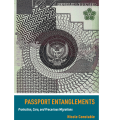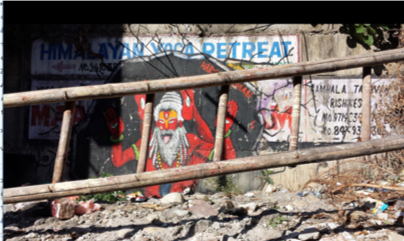
Nicole Constable received her PhD from the University of California, Berkeley in 1989. She is a sociocultural anthropologist whose primary research focus is gendered migration in and from Asia. She is also very interested in different modes of ethnographic and anthropological writing. Her main geographical research areas are Hong Kong, China, the Philippines, Indonesia and Singapore. Her topical interests include migration and mobilities; intimate labor; gender and sexuality; and precarious citizenship and the state.
She is former Associate Dean of Graduate Studies and Research in the Dietrich School of Arts and Sciences, and former Director of the Asian Studies Center at the University of Pittsburgh. She was the J Y Pillay Global-Asia Professor of Social Sciences at Yale-NUS College in Singapore. She especially enjoys teaching about the poetics and politics of ethnographic writing, about gender and sexuality in East Asia, and about global intimacies. She has twice taught and co-directed Pitt in the Himalayas.
Research Description
 Nicole Constable’s most recent ethnographic monographs reflect her interest and expertise in gender and migration. These include Romance on a Global Stage: Pen Pals, Virtual Ethnography, and ‘Mail Order’ Marriages (2003), a political-economic examination of love, romance, and cross-border courtships between U.S. men and Asian women. This book serves as a well-informed ethnographic critique of popular misrepresentations of “mail order brides.” Maid to Order in Hong Kong: Stories of Migrant Workers (2nd ed., 2007) examines the
Nicole Constable’s most recent ethnographic monographs reflect her interest and expertise in gender and migration. These include Romance on a Global Stage: Pen Pals, Virtual Ethnography, and ‘Mail Order’ Marriages (2003), a political-economic examination of love, romance, and cross-border courtships between U.S. men and Asian women. This book serves as a well-informed ethnographic critique of popular misrepresentations of “mail order brides.” Maid to Order in Hong Kong: Stories of Migrant Workers (2nd ed., 2007) examines the  various forms of power and discipline that influence the daily experiences of Filipino and Indonesian migrant domestic workers in Hong Kong, and their active forms of protest and subtle forms of resistance. Following this book, she has written several articles about migrant worker activism and protest. Her latest book, Born Out of Place: Migrant Mothers
various forms of power and discipline that influence the daily experiences of Filipino and Indonesian migrant domestic workers in Hong Kong, and their active forms of protest and subtle forms of resistance. Following this book, she has written several articles about migrant worker activism and protest. Her latest book, Born Out of Place: Migrant Mothers  and the Politics of International Labor (2014), builds on her work among women migrant workers in Hong Kong, and focuses on those who become mothers, despite local pressures to be “just workers.” This book provides insight into global problems of mobility, family, and citizenship and points to the consequences, creative responses, melodramas, and tragedies of labor and migration policies. Following this project, Dr. Constable’s recent articles focus on human trafficking, and on temporary and precarious labor and what can be considered queer or nonnormative transnational family formations.
and the Politics of International Labor (2014), builds on her work among women migrant workers in Hong Kong, and focuses on those who become mothers, despite local pressures to be “just workers.” This book provides insight into global problems of mobility, family, and citizenship and points to the consequences, creative responses, melodramas, and tragedies of labor and migration policies. Following this project, Dr. Constable’s recent articles focus on human trafficking, and on temporary and precarious labor and what can be considered queer or nonnormative transnational family formations.
 Dr. Constable has been working on a new book about passports and precarious migration. Passports are fascinating in and of themselves, but even more so because they provide a unique entry point from which to understand the many challenges faced by migrant workers, especially after their government institutes a new biometric passport system and aims to uncover “fake passport data.” Based largely on ethnographic research among Indonesian migrant workers, consular officials and others in Hong Kong, the book also traces the stories and histories of “real but fake” (aspal) Indonesian passports back to Indonesia, and across temporalities and scales. “Entanglements” provide the main analytical framework from which to analyze and criticize the oversimplified binaries associated with passports (e.g., real and fake, care and control), with migration (e.g., migrant and citizen, free and unfree), and with ethnography (e.g., ethnographer and interlocutor, research and researched). The book is entitled Passport Entanglements: Protection, Care and Precarious Migrations and will come out later in 2022 with University of California Press.
Dr. Constable has been working on a new book about passports and precarious migration. Passports are fascinating in and of themselves, but even more so because they provide a unique entry point from which to understand the many challenges faced by migrant workers, especially after their government institutes a new biometric passport system and aims to uncover “fake passport data.” Based largely on ethnographic research among Indonesian migrant workers, consular officials and others in Hong Kong, the book also traces the stories and histories of “real but fake” (aspal) Indonesian passports back to Indonesia, and across temporalities and scales. “Entanglements” provide the main analytical framework from which to analyze and criticize the oversimplified binaries associated with passports (e.g., real and fake, care and control), with migration (e.g., migrant and citizen, free and unfree), and with ethnography (e.g., ethnographer and interlocutor, research and researched). The book is entitled Passport Entanglements: Protection, Care and Precarious Migrations and will come out later in 2022 with University of California Press.

Courses
Anthropology 1750 Undergraduate Seminar: Writing Culture
 This class introduces several different anthropological and ethnographic writing styles and theoretical approaches while encouraging you to think about what anthropology can contribute to our understanding and appreciation of human diversity in the world today. In this class you will “try on” different writing styles and theoretical approaches. Throughout the class we will examine the poetics (writing style) and politics (forms of power) associated with different approaches and types of ethnographic writing.
This class introduces several different anthropological and ethnographic writing styles and theoretical approaches while encouraging you to think about what anthropology can contribute to our understanding and appreciation of human diversity in the world today. In this class you will “try on” different writing styles and theoretical approaches. Throughout the class we will examine the poetics (writing style) and politics (forms of power) associated with different approaches and types of ethnographic writing.
Anthropology 1734 Undergraduate Seminar: Gender in East Asia
This anthropology undergraduate seminar focuses on gender and sexuality in contemporary East Asia, particularly in China, Japan, and South Korea (also touching on Hong Kong and Taiwan). The course is comparative, as we examine differences and continuities within and between these regions. Themes covered vary according to recent research trends, the availability of scholarly materials, and key issues in each region. Topics we will cover include: orientalism in relation to femininity and masculinity in East Asia; economic change and family roles; labor migration; heteronormativity and queerness; sexuality, work, and class; agency and resistance.
Anthropology 2782 Global Intimacies: Sex, Marriage, and Reproductive Labors
This graduate seminar explores theoretical and ethnographic approaches to global intimacies, particularly intimate and reproductive labor such as domestic work, sex work, surrogacy, medical tourism, transgender surgeries, cross-border marriages, and others. Readings will focus on ethnographic case studies that illustrate how global mobilities are linked to intimate relations. We will explore intersections of sex, labor, power, love and money in a globalizing world, and will examine scholarly approaches that are informed by feminism, migration studies, queer studies, postmodernism, capitalism, globalization, gender, and human trafficking. This course is particularly relevant to those with an academic interest in the intimate cultural and critical politics of sex, love, labor, and gendered migration within the context of global capitalism.
Publications
Constable. N. (2022). Passport Entanglements: Protection, Care, and Precarious Migration. Berkeley: University of California Press.
https://www.ucpress.edu/book/9780520387997/passport-entanglements
Constable, N. (2021) “Simultaneous Citizen and Noncitizen: Displacement, Precarity, and Passports in Hong Kong” Humanity 12(3): 324-38.
10.1353/hum.2021.0021
Constable, N. (2021) “Continual Arrival and the Longue Durée: Emplacement as Activism among Migrant Workers in Hong Kong.” Migration Studies DOI:10.1093/migration/mnab034. https://academic.oup.com/migration/advance-article/doi/10.1093/migration/mnab034/6414592?guestAccessKey=f9edd54d-f166-4496-a69e-fb43526291ec
Constable, N. (2021) “Gender and Generational Issues in an Age of Migration” In: Migration, Gender, and The Politics of Belonging: The Case of Korean Diaspora, eds. Dohye Kim, Minjung Kim, Seoul, Korea: is Dongnyok Publishing (동녘출판사) pp. 23-51.
Constable, N. (2021) “Migrant Mothers, Rejected Refugees and Excluded-Belonging in Hong Kong.” Population, Space and Place DOI:10.1002/psp.2475.
Constable, N. (2020) “Afterword: Rethinking Ethnographic Entanglements of Care and Control.” Ethnos 85:2, 327-334, https://doi.org/10.1080/00141844.2018.1543343
Constable, N. (2019) “Maids, Mistresses, and Wives: Rethinking Kinship and the Domestic Sphere in Twenty-first Century Hong Kong.” Cambridge Handbook for the Anthropology of Kinship, Cambridge University Press.
Constable, N. (2019) “Tales of Two Cities: Legislating Pregnancy and Marriage among Foreign Domestic Workers in Singapore and Hong Kong.” Journal of Ethnic and Migration Studies. https://doi.org/10.1080/1369183X.2019.1592403
Constable, N. (2018) “Temporary Intimacies, Incipient Transnationalism, and Failed Cross-Border Marriages.” In: Intimate Mobilities: Sexual Economies, Marriage and Migration in a Disparate World. C. Groes and N. Fernandez, eds. NY: Berghahn. Pp. 52-73.
Constable, N. (2018) “Assemblages and Affect: Migrant Labour and the Varieties of Absent Children,” Global Networks, 18(1): 168-185. (Global Assemblages, absent Children, queer families, precarity, migrant mothers, adoption and fostering)
Constable, N. (2017) “Familial Migration Strategies and the Cultural Logics of Desire: a case of Asian-U.S. Correspondence Marriages” Anthropology of this Century 20 http://aotcpress.com/archive/issue-20/. (love, desire, global Intimacies, cross border marriage, matchmaking)
Constable, N (2016) “Reproductive Labor at the Intersection of Three Intimate Industries: Domestic Work, Sex Tourism, and Adoption,” Positions: Asia Critique, 24(1):45-69. (surplus labor, migrant workers, adoption, sex work, unpaid labor)
Constable, N. (2016) “Discipline, Control, and the Ins and Outs of Prison for Migrant Overstayers in Hong Kong,” Migration, Mobility, and Displacement, 20(1):58-72. (assemblages, incarceration, ssylum seekers, migrant workers, networks, disciplinary spaces)
Constable, N (2015) “Migrant Motherhood, ‘Failed Migration’, and the Gendered Risks of Precarious Labour,” TRaNS: Trans-Regional and -National Studies of Southeast Asia, 3(1):135-151. (precarious labor, temporary migration, single mothers, Hong Kong, Indonesia)
Constable, N. (2014) Born Out of Place: Migrant Mothers and the Politics of International Labor, Berkeley: University of California Press. (migration, labor, precarity, children, citizenship, undocumented migration, reproductive labor, gender, sexuality, Indonesians, Filipinos, Hong Kong.
Constable, N. (2013) Migrant Workers, Legal Tactics, and Fragile Family Formation in Hong Kong. Oñati Socio-Legal Series, 3 (6), 1004-1022.
Constable, N. (2011) Editor. Migrant Domestic Workers in Asia: Distant Divides and Intimate Connections, New York: Routledge Press. [Precarious workers, migrant labor, activism, domestic Workers, Inter-Asian connections, global networks, reproductive labor]
Constable, N. (2007 [1997]) Maid to Order in Hong Kong: Stories of Migrant Workers (second edition), Ithaca: Cornell University Press. [Domestic workers, Hong Kong, migrant workers, gender, labor discipline, protest and activism, labor migration]
Constable, N. (2005) Cross-Border Marriages: Gender and Mobility in Transnational Asia, Philadelphia: Univ. of Pennsylvania Press. (Cross-border marriage, transnationalism, matchmaking, marriage-scapes, gender, marriage brokers, global hypergamy)
Constable, N. (2003) Romance on a Global Stage: Pen Pals, Virtual Ethnography, and ‘Mail Order’ Marriages, Berkeley: University of California Press. (Global intimacies, marriage migration, cross-border marriages, internet ethnography)
1996/2005 (editor) Guest People: Hakka Identity in China and Abroad. Seattle: University of Washington Press. (Second edition, paperback, Spring 2005)
Constable, N. (1994) Christian Souls and Chinese Spirits: A Hakka Community in Hong Kong. Berkeley and Los Angeles: University of California Press.